Current News
/ArcaMax

Immigration crackdowns disrupt the caregiving industry. Families pay the price
Alanys Ortiz reads Josephine Senek’s cues before she speaks. Josephine, who lives with a rare and debilitating genetic condition, fidgets her fingers when she’s tired and bites the air when something hurts.
Josephine, 16, has been diagnosed with tetrasomy 8p mosaicism, severe autism, severe obsessive-compulsive disorder, and attention-...Read more

Florida AG targets State Attorney Monique Worrell after she unveils new policy for case backlog
ORLANDO, Fla. — Florida’s attorney general seemed to signal this week that Orange-Osceola State Attorney Monique Worrell was again in GOP leaders’ sights, just months months after Central Florida voters returned her to office.
James Uthmeier took to social media late Thursday to denounce a new policy of Worrell’s office, calling it “...Read more

A Cuban exile needed a home. Now he's repaying the favor
TAMPA, Fla. — Daniel Llorente stood outside the home he’s renting late last summer, holding the an American flag, ready to place it at the entrance.
His housemate, Ralph Buran, told Llorente he should put it on the left side of the house, not the right.
“Why the left?” Buran recalls Llorente asking. “I didn’t know that.”
“Kind...Read more
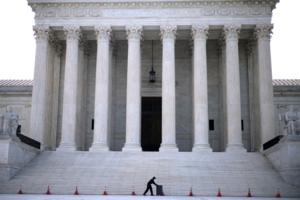
Should states fund religious charter schools? What Americans said in new poll
A majority of Americans said they don’t think states should be required to provide funding for religious charter schools, according to a new poll.
Fifty-seven percent of U.S. adults said states can refuse to fund religious charter schools, while 43% said states are required to do so, according to a poll published this week by Marquette Law ...Read more

George Santos should get seven years for campaign fraud, US says
WASHINGTON — Former U.S. Rep. George Santos should be sentenced to more than seven years in prison for committing fraud while campaigning for Congress, federal prosecutors said.
A “significant” sentence is needed to protect the public from the Long Island, New York, Republican to prevent him from “adding new victims to the list of ...Read more
10th Circuit freezes order requiring Colorado school district to put 19 books back on shelves
DENVER — The saga surrounding 19 “highly sensitive” books that Colorado’s Elizabeth School District removed from its libraries last year continued Friday as the 10th U.S. Circuit Court of Appeals paused a federal judge’s order requiring the district to re-shelve the titles.
U.S. District Judge Charlotte N. Sweeney on Thursday had ...Read more

Alleged member of online 764 movement arrested for child sextortion in plot to accelerate world downfall
A California man has been arrested for possessing and extorting child pornography and other disturbing content as part of his role in the violent online network 764, which aims to accelerate the “downfall of the current world order,” according to the feds.
Jose Henry Ayala Casamiro was taken into custody by the FBI on allegations that he �...Read more

Trump pulls back Biden's plan to cover weight loss drugs
WASHINGTON — The Trump administration will not finalize a Biden-era plan to require coverage of anti-obesity medications in Medicare and Medicaid.
In a rule finalized Friday afternoon, the Centers for Medicare and Medicaid Services stated it does not intend to continue with the Biden proposal, which was released in November.
CMS did not ...Read more
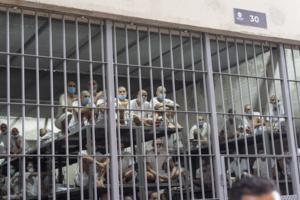
US ordered to return man mistakenly sent to El Salvador prison
WASHINGTON — A federal judge gave the government until the end of Monday to return a man to the U.S. after it said it had mistakenly sent him to a prison in El Salvador in an “administrative error.”
U.S. District Judge Paula Xinis on Friday ordered the government to get Kilmar Armando Abrego Garcia back from El Salvador’s notorious ...Read more

Haiti human rights groups criticize plan to tap members of rogue force to fight gangs
Human-rights groups are pushing back against a proposal by Haiti authorities to enlist members of a rogue force into the fight against a powerful gang alliance carrying out a deadly siege in three of the country’s 10 regional departments.
“It’s scandalous,” said Samuel Madistin, an attorney and president of the Fondasyon Je Klere/ Eyes ...Read more

Federal judge rebuffs Trump again in Venezuelan TPS case, blocking deportations
A federal judge in San Francisco rebuffed the Trump administration again in a major immigration case on Friday, saying he is sticking to his decision to stop the government’s revocation of deportation protections this month for hundreds of thousands of Venezuelans in Florida and other states.
U.S. District Judge Edward M. Chen cited several ...Read more
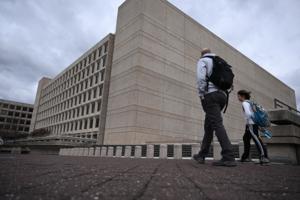
Trump team proposes ending Office of Clean Energy, cutting billions
WASHINGTON — The U.S. Energy Department is proposing to shut down its Office of Clean Energy Demonstrations and cut roughly $9 billion in awards for programs regarding carbon capture, direct air capture, solar and hydrogen, according to documents seen by Bloomberg.
Under the plan, which isn’t final, the $27 billion agency’s staff would ...Read more
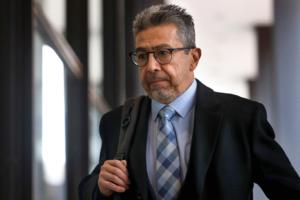
Feds make long-promised move to drop charges against former Chicago Alderman Daniel Solis
CHICAGO — The U.S. attorney’s office officially has moved to drop the criminal case against high-profile government mole Daniel Solis, the former alderman who played key roles in federal prosecutions that brought down two of Chicago’s Democratic kingpins, ex-House Speaker Michael Madigan and ex-Alderman Edward Burke.
In a long-anticipated...Read more

Mayor Johnson responds to Trump threat to revoke Chicago school funding over DEI: 'We're gonna sue'
CHICAGO — Mayor Brandon Johnson promised Friday to go to court to protect hundreds of millions of dollars in federal money for Chicago schools if President Donald Trump follows through on a threat to revoke the funds from districts that promote diversity, equity and inclusion (DEI) practices, though no immediate action was taken.
“We’re ...Read more

NY State Education Department won't sign Trump administration's anti-DEI certification -- risking federal funds
NEW YORK — The New York State Education Department announced Friday it will not sign a certification against diversity, equity and inclusion (DEI) practices as directed by the Trump administration — at the risk of losing federal funding.
A letter sent the day before by the U.S. Department of Education gave state commissioners 10 days to ...Read more

14-year-old accused of fatally shooting Newark cop expected to be tried as adult
A 14-year-old accused of gunning down a pair of New Jersey police officers, killing one of them, is expected to be tried as an adult in the shooting.
The unidentified teen is facing counts including murder, attempted murder and possession of illegal weapons in connection with the gun battle in Newark last month, culminating in the shooting ...Read more
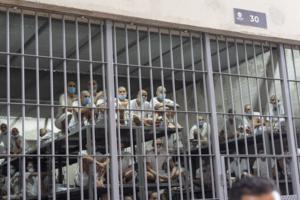
US ordered to return man mistakenly sent to El Salvador prison
WASHINGTON — A federal judge gave the government until the end of Monday to return a man to the U.S. after it said it had mistakenly sent him to a prison in El Salvador in an “administrative error.”
U.S. District Judge Paula Xinis on Friday ordered the government to get Kilmar Armando Abrego Garcia back from El Salvador’s notorious ...Read more
News briefs
Will Texas ban kids from TikTok, social media? Bill aiming to limit digital access advances
DALLAS — Social media companies could face penalties if they knowingly allow children to use their platforms under a bill that was recently advanced by a House Committee.
House Bill 186, introduced by Rep. Jared Patterson, R-Frisco, was advanced out ...Read more

Nasdaq 100 is now in bear market amid growth scare: Markets wrap
A selloff in stocks deepened, bonds climbed and oil tumbled to a four-year low as Federal Reserve Chair Jerome Powell signaled the damage of a trade war will be bigger than anticipated, with the potential effects including higher inflation and slower growth.
Despite the economic risks from President Donald Trump’s trade war such as China’s...Read more

Billboard bashes Rubio, Miami's Republican Congress members as 'traitors' to immigrants
MIAMI — The Miami-Dade Democratic Hispanic Caucus is taking a campaign against Florida’s Cuban American Republicans not to the airwaves, but the highway.
A new billboard, which is going up on the Palmetto Expressway between Doral and Hialeah, takes aim at Secretary of State Marco Rubio and U.S. Reps. María Elvira Salazar, Carlos Giménez, ...Read more
Popular Stories
- Lawmakers launch bipartisan push to save 9/11 WTC program from RFK Jr. cuts
- The hidden power of marathon Senate speeches: What history tells us about Cory Booker’s 25-hour oration
- Trump tariffs prompt retaliation, plunging stocks, auto plant shutdowns
- Gov. Gavin Newsom asks world leaders to spare California from retaliatory tariffs
- Alexander brothers say they're being denied evidence. State says feds won't share seized cellphones





